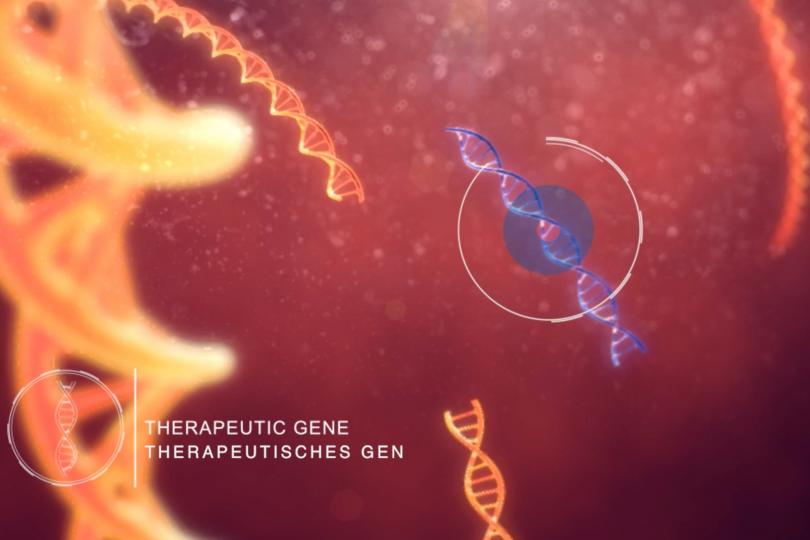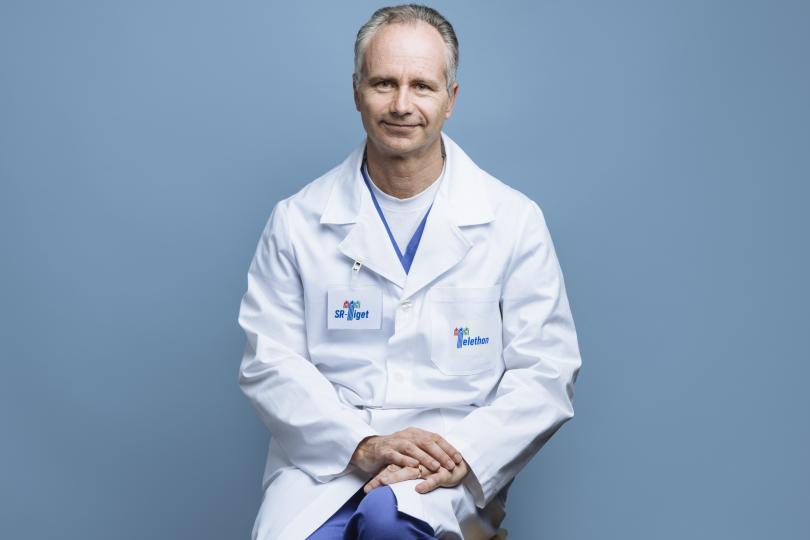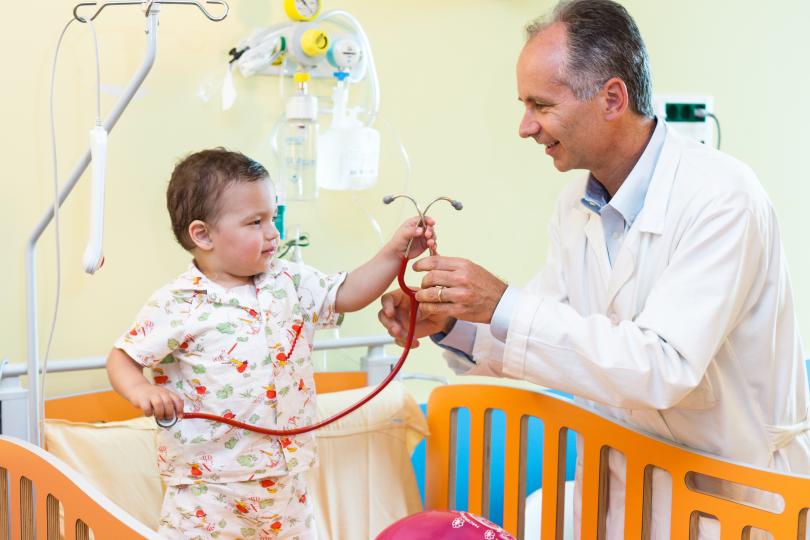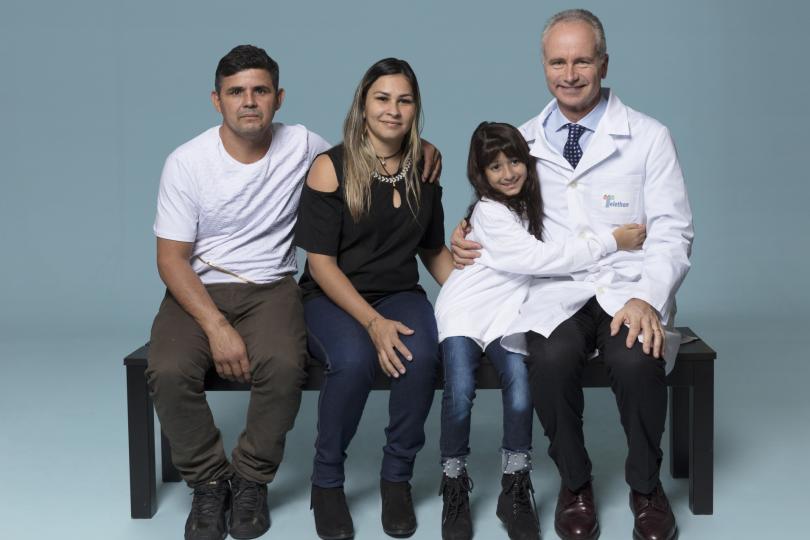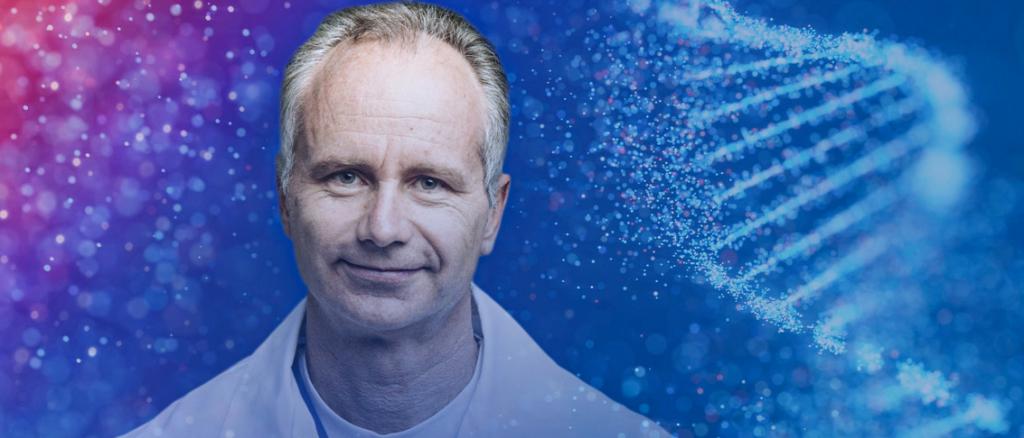
Interview with Prof. Dr. Alessandro Aiuti
“We want to widen the spectrum of diseases that we can treat by gene therapy”
Prof. Dr. Alessandro Aiuti from the San Raffaele Telethon Institute for Gene Therapy (SR-Tiget) in Milan was awarded with the Else Kröner Fresenius Prize for Medical Research 2020 for his contributions to the development of gene therapies for rare diseases. One of the success stories that is sticking out from his work is the gene therapy for ADA-SCID (Adenosine Deaminase Severe Combined Immuno Deficiency). We talked to Alessandro Aiuti about his work that also approaches other rare diseases.
Learning from the development of the therapy for ADA-SCID we have so far treated four other diseases at SR-Tiget. These include other Immunodeficiencies such as the Wiskott Aldrich Syndrome, a disease that affects boys and for example causes bleeding and a high susceptibility to infections. We have also treated patients with Beta Thalassemia, a disorder that causes anemia. And then, there are two metabolic diseases that elicit rapid degeneration processes: Metachromatic Leukodystrophy is a fatal disorder due to the accumulation of toxic substances in the brain. Finally, Mucopolysaccharidosis Type 1 is a rare lysosomal storage disorder affecting mainly the brain and the skeleton for which we started two years ago a clinical trial. Our gene therapy approaches have been effective in most of the patients that have been treated so far and there is also a safe profile. So, these data are really encouraging and also lead us to move to other genetic diseases for the application of gene therapy and gene editing, such as other immune system disorders, red blood cell diseases, diseases of accumulation, and other metabolic diseases.
I think there are several aspects. Personally, I have always dreamed to be a researcher. The curiosity to explore new things was always driving und pushing me forward. Besides this passion and commitment, every day I come to work to really try to solve problems and find solutions for the patients. We do not stop when we have achieved something. We really know that behind every child that has been successfully cured, there are also many others who still need an effective cure. However, these successes cannot be achieved by a single person. It is something that absolutely needs teamwork. These efforts are made by many people: researchers, technicians, clinicians, nurses and all support staff. The whole team at SR-Tiget worked hard over the past 20 years to bring research forward. This work was also lead by the SR-Tiget directors Prof. Bordignon, Prof. Roncarolo, and Prof. Naldini. So it is really thanks to these team efforts, that we could achieve these extraordinary results. After we showed that actually these treatments worked in the patients and that they were safe, this was extremely rewarding for all of us because we participated and kept on going on this long journey. Realizing after so many years of hard work that there was something that now could turn into a better life of the children, and could become a lifesaving treatment was extremely great for us.
It takes many years, at least 10 to 15 years to develop treatments as complex as a gene therapy. Many things must come together. With the big goal to fix the blood stem cells, we first had to start with building a vector. Such a vector is derived from a virus and delivers the healthy gene into the cell. For this vector development, you also need to develop assays to see whether the vector and the gene transfer is working. This is done with in vitro-assays in preclinical studies. Only after this preclinical part has been successfully completed, you can think of going to the patient and planning a clinical trial. This is a very long way but it is important to go this rigorous way of assessing the safety and efficacy of a new treatment.
It is not easy to develop a treatment from basic research to successful clinical application. You have to think ahead, developing something that could be suitable for patients. Actually, not all of your ideas or approaches are suitable to go to large scale and to patients because they turn out not to be safe, for example. So you can learn a lot from studying patients, for example by thoroughly examining patient’s cells, by learning from other drugs and by translating experiences and successes of other treatments. For example, we learned a lot from the transplantation of hematopoietic stem cells from healthy donors, which was in place for 50 years: this was a very important knowledge for us that we needed to bring to the field of gene therapy. So, I think it’s a mixture of science, development and clinical observation. And by the way, clinician scientists, that means physicians that are doing research, are very important. They are the ones that bring in the knowledge from research, and also the expertise from being a clinician that is seeing patients.
Our goal is to develop novel and safe approaches to treat genetic diseases using hematopoietic stem cells. We want to widen the spectrum of diseases that we can treat by gene therapy. The prize money will be used for three different research goals. In the first one, we will learn better how the blood stem cells will behave in the patient’s bodies after gene therapy. We will track the modified cells to understand if these stem cells behave normally after many years of the gene therapy. We want to explore how many of them will function and how many of them will be active. In a second goal we will study other diseases which are caused by defects in metabolic enzymes such as Mucopolysaccharidosis. In that case, the hematopoetic stem cells function as a delivery tool of therapeutic enzymes to different tissues like the bones or the brain. In these places, they can locally produce high levels of the therapeutic enzyme in order to correct also the malfunction of organs. The third research line will explore gene therapy and gene editing approaches for autoinflammatory diseases. In these disorders, the immune system is continuously active due to genetic mutations. So we want to precisely intervene in the regulation of the innate immune response and think that in this case the gene editing and gene therapy approaches will be suitable.
Newly developed gene therapies against hereditary diseases
With his work, Alessandro Aiuti has made a major contribution to ensuring that patients with rare, hereditary immune defects and metabolic diseases can be successfully treated with new gene therapies. Together with his team, he pushed forward the development of successful gene therapy approaches for diseases such as Wiskott-Aldrich Syndrome or Metachromatic Leukodystrophy. He achieved a widely recognized success as a key figure in the development of a gene therapy for ADA-SCID (Adenosine Deaminase Severe Combined Immuno Deficiency). This gene therapy and the achievement of its market approval in Europe is considered to be one of the most important results in the development of gene therapies worldwide. "An international leader who will continue to write gene therapy history," the jury said in its statement.
Successful treatment of ADA-SCID
In the case of the rare immune disorder ADA-SCID, which exclusively afflicts young children and occurs about 15 times a year in Europe, a defective ADA gene within the genome disrupts lymphocyte development, leaving the young patient’s body defenseless against infections. Standard for this therapy is a bone marrow transplantation from a fully matched sibling.
However, a suitable donor is available only for a minority of patients.
With the gene therapy from Milan there is an alternative for these children. After successful clinical trials, the gene therapy developed for ADA-SCID patients was approved as a pharmaceutical remedy in Europe.
The therapy is based on the patient's own living cells whose DNA is modified. For the treatment, certain blood stem cells (CD34+) are collected from the patient. Outside the body, these cells are treated using a viral vector to introduce the correct version of the gene for the ADA enzyme. The genetically modified cells are returned to the patient’s bloodstream via intravenous infusion. Portions of the modified cells subsequently establish themselves in bone marrow again. The patient now has blood stem cells that function properly and produce lymphocytes to defend against infections – presumably on a life-long basis.
The decision regarding the prize recipient was made by a ten-member international jury composed of renowned research scientists in the fields of genome editing and gene therapy along with delegates from the Scientific Commission at EKFS. Hildegard Büning, chairwoman of the jury and president of the European Society for Gene and Cell Therapy (ESGCT), substantiates the jury’s decision.
Alessandro Aiuti wants to use the prize money from EKFS to optimize the therapies further and map out the healing mechanisms involved in a better fashion. The scientist sees another major challenge in conveying the acquired knowledge beyond the successful gene therapies from Milan to as many other genetic disorders as possible.
Alessandro Aiuti was born in Rome in 1966 and studied medicine there at Sapienza University. Following a stay at Harvard Medical School in Boston, Massachusetts in the USA, he received his doctorate in Human Biology in 1996 from Sapienza University. Since 1997 he has been active at the San Raffaele Scientific Institute in Milan, where he meanwhile also teaches as a professor at the Vita Salute San Raffaele University. He is furthermore Deputy Director of Clinical Research at the San Raffaele Telethon Institute for Gene Therapy and Head of the Pediatric Immunohematology Unit at San Raffaele Hospital.
Aiuti is the author of numerous and highly acclaimed publications. Over the course of his career he has received a number of prizes from national and international institutions. Aiuti is a member of the board of the European Society of Gene and Cell Therapy, and a member of the EMA Committee for Advanced Therapies since 2019.
Aiuti is married to Laura since 1993 and has two daughters, Francesca and Camilla. He likes to travel and go to the cinema, and he enjoys sports, especially sailing, skiing and running (often with his dog).
An international jury comprised of ten renowned researchers in the fields of genome editing and gene therapy together with representatives from the Scientific Commission at EKFS decided on who shall receive the prize.
- Hildegard Büning, Hannover Medical School (Germany), jury chairwoman
- Michele Calos, Stanford University (USA)
- Nathalie Cartier, French Institute of Health and Medical Research, Paris (France)
- Stefan Endres, Ludwig-Maximilians-University Munich (Germany)
- Guangping Gao, University of Massachusetts (USA)
- Christine Klein, University of Lübeck (Germany)
- Luigi Naldini, San Raffaele Telethon Institute for Gene Therapy, Milan (Italy)
- Amit Nathwani, University College London (United Kingdom)
- Virginijus Šikšnys, Vilnius University (Lithuania)Adrian Thrasher, University College London (United Kingdom)
